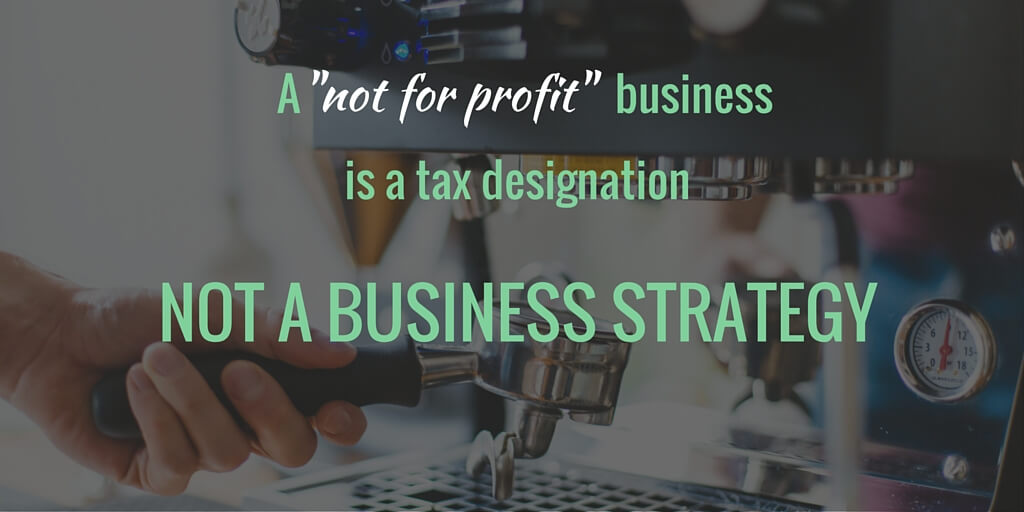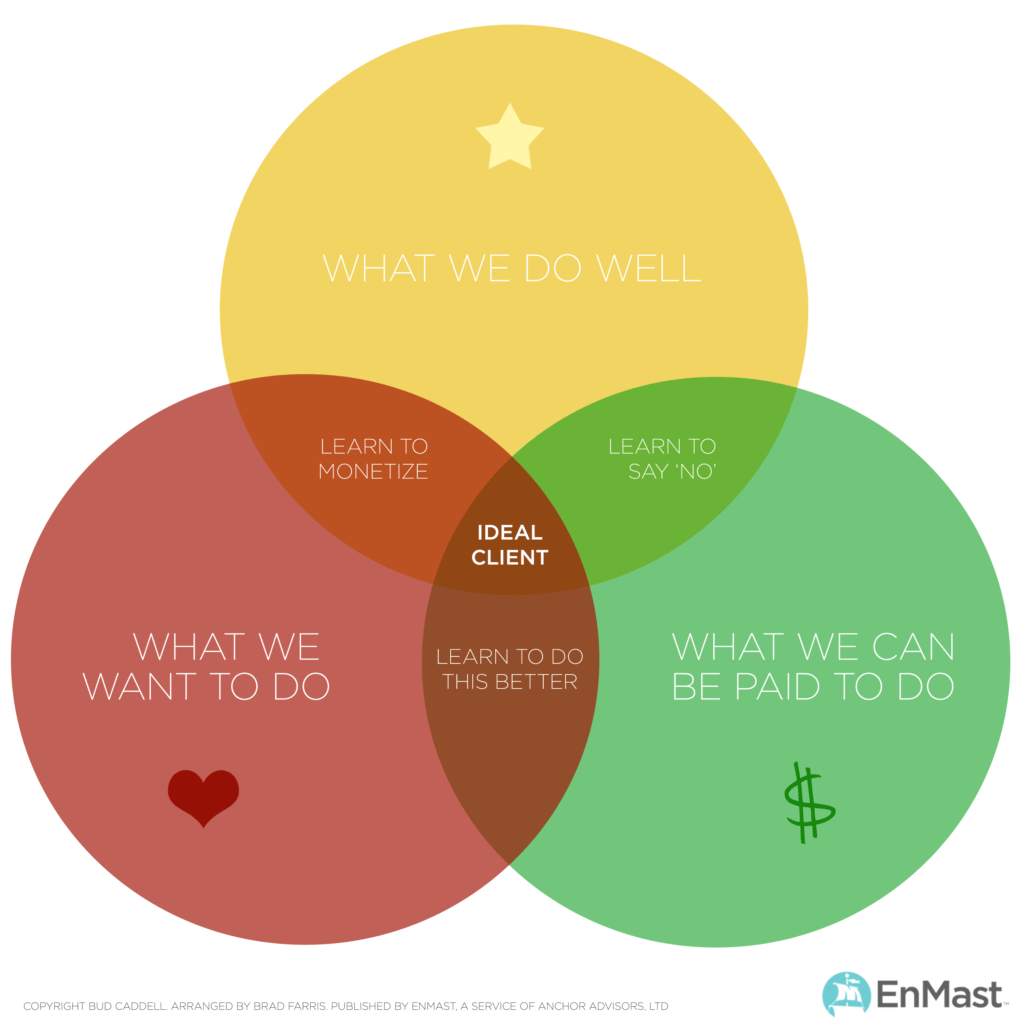When is it OK not to make money?
“A ‘not for profit business’ is a tax designation, not a business strategy.”
Not everything that we try to do is going to make money for us right away. Most of the time, when we start something new, we have to make an “investment” (in working capital, in equipment, in training, etc.) before that effort starts to make money. In most cases the learning curve on a new business (or even a new product within our existing business) is longer than we want it to be. We get to a point where we start asking ourselves, “Should I keep doing this?”.
Or, you might have a line of business that you’ve been in for a long time; and as your business has changed and grown, you are finding that some areas of your business are more profitable than others. Should we just stop doing the less profitable stuff? It’s hard to know when it’s time to stop doing those things and just make more money.
As much as we wish that our business would always be profitable, growing, and productive, you don’t have to be in business long to realize that that just isn’t very likely. Sooner or later we all have to face the choice to keep going with something that’s not profitable, or make a change to focus our energies and resources elsewhere.
The first thing to realize, is that no one can “lose money” forever. Eventually we go broke! It’s not a good idea to just “break even” forever, either. Over time, every business is accumulating liabilities: risks of being sued, unpaid retirement savings, etc. All of those bills will eventually have to be paid. We can’t do that if we aren’t making money.
I’m at this point with my podcast. It’s not a big money loser—in most years it covers it’s cost—but it’s definitely not a big money maker. It does take some of my time and focus. Should I keep doing it?
This diagram can help us to answer this question. Our ideal business is right in the center of this Venn diagram. Whatever that happens to be, it’s our ideal because we love doing it, we’re great at it, and people will pay us for it! This other thing we do (that doesn’t make much money) is outside of the “people will pay you for it” ring; so let’s look at what that means.
1. Do you love it?
Sometimes there are things that are just so much fun that you don’t want to let them go. These are things that “feed your soul”, that make you look forward to going to work, that help save you from burnout. If it doesn’t feed your soul, and you can’t get paid well for it, then you need to stop doing it. No matter how good you get at it, no matter how much money it makes you, it’s going to be a drain on your resources.
Having some part of your business that brings you joy is a good enough reason to keep going all by itself. But that makes this more like a hobby than a business. Are there other, cheaper, hobbies that would bring similar joy?
The podcast is absolutely the most fun thing I get to do at work. It’s a blast. It definitely passes this test. As a hobby it’s pretty cheap (it only costs me time right now); and it may bring some other benefits (we’ll talk about those later). I’m going to say it passes this test with flying colors.
2. Is someone else getting paid for it?
First, we need to know if there is hope. Is anyone making a good living doing this thing? Are there people out there who are getting paid well to do it? If so, then there is hope. You may just need to get better at what you are doing. Improving your skills—and making sure that your target market is aware of those improving skills—may help you to turn the corner.
As far as podcasts go, there are definitely people making real money on podcasts. Those people have a bigger audience than we do. Some have products or services that they advertise on their own podcast, others have sponsorships; but success in either case comes from having a bigger audience (getting better at podcasting could help with that). So if we make a better podcast—and keep it in front of our target audience—it could grow to make real money. Check!
3. Are you getting better at it?
So. If there are people making money at it, then it looks like we just need to improve our skills, right? How do you know you are getting better at it? Do you have some objective standards that tell you you’re getting better? How can you see progress in your skills?
For the podcast we are looking at a few things. Is our audience growing? (It grows sporadically, not as consistently as we’d like.) Are we getting recognized? (Yes, we’ve made it to several lists-of-top-business-podcasts.) Is our audience responding? (Not as much as we’d like. We’ve had more iTunes reviews lately, but we don’t get as many call-ins or emails as we’d like.) I’ll call that a push; the talent is getting better, but it’s possible the show concept still needs to evolve.
4. Does it make it possible for you to sell something else?
Sometimes we maintain a money losing product or service because when we have that service it’s a way to sell something else. (Often called a “Loss leader”). This can be tricky. I’ve seen many business owners talk themselves into believing that they will lose tons of business if they quit this money losing line, but they’ve never tested it. If you are trying to hold onto a particular line of business because you think it leads to other—more profitable—business, you need to track it carefully. Try selling some clients without using the ”crutch” of your loss leader and see how it goes.
For the podcast, it has lead to sales for my co-host; and I have clients who listen, but I can’t track any new customers that have come from the podcast. Score that a “no”.
5. Are there benefits that it brings besides money (and joy)?
Since we already talked about joy as a side benefit in #1, I want to look at other non-monetary benefits. Does engaging in this line of business bring you into contact with influencers, or prospects? Does it increase your business profile in a way that gets you business? Does it give you a perspective on your industry or your customer’s industry so that you can better predict the future? Does it attract people who want to come work for you? These are all non-monetary benefits that might make me want to keep doing something.
I often hear this argument for doing free speaking engagements: *you don’t make money, but you get exposure*. This argument only holds for me if that exposure really turns into business. It should—if you are in front of the right audience and demonstrating your expertise. If it does, keep doing it. But be sure to measure. And be honest with yourself. Sometimes this thing is really just feeding your ego and wasting your time.
The podcast guests are often interesting people. Many are influencers who might be able to connect me to businesses, speaking gigs, etc. The press we are getting also raises my profile as a host. But none of that has turned into business for me. So there are non-monetary benefits, but not strong ones. I think the podcast fails this test for now.
So, the podcast scores 2 “Yes”, 1 “No” and 2 ties – that’s still enough for me to keep going for now. We’re trying hard to get better; I could work harder to get value out of the guest connections; and it’s just so much fun it’s hard to give up. But it’s a close decision, so I need to revisit it to see if those changes improve the score as time goes by…
How about you? Is there a product, service, customer group, or activity that you invest your focus and attention in that’s just not providing the monetary returns you expect? Is it time to cut it loose? What do you think? Let me know!


